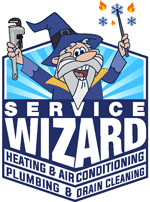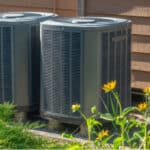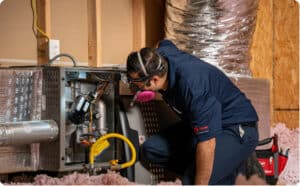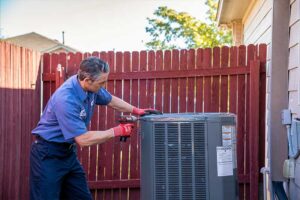Heating is a crucial component of any home, providing comfort and ensuring a safe and cozy environment during the cold winter season. There are numerous types of heating systems that work for different homes, depending on your location, budget, energy efficiency requirements, and personal preferences.
Find out all you need to know about choosing the best heating options for your home and their advantages and disadvantages of heater replacement from the pros at Service Wizard.
Furnaces
Furnaces are one of the most common and traditional heating options for homes. They work by heating air and distributing it throughout the house using a system of ducts. There are several types of furnaces, including gas, electric, and oil furnaces.
The advantages of furnaces include:
- Efficiency:Gas furnaces are generally more efficient and cost effective than other types, making them a popular choice.
- Quick heat:Furnaces can heat a home relatively quickly, ensuring you stay warm on cold winter days.
- Distribution:Ducted systems allow for even heat distribution throughout your home.
Here are the disadvantages of furnaces:
- Cost:Gas furnaces can be expensive to install, especially if your home doesn’t have existing ductwork.
- Maintenance:Regular maintenance is necessary to ensure optimal performance and safety.
- Environmental impact:Gas and oil furnaces produce greenhouse gas emissions, impacting the environment.
Boilers
Boilers are another popular heating option, especially in colder regions. They heat water and the resulting steam or hot water is distributed through radiators or underfloor heating systems to warm the space.

- Even heat distribution:Boilers provide consistent and even heat throughout the home, reducing hot and cold spots.
- Energy efficiency:Modern boilers are highly energy efficient, which can lead to cost savings over time.
- Quiet operations:Boilers operate quietly, making them a peaceful choice for home heating.
The disadvantages of boilers include:
- Installation cost:Boiler installation can be more expensive, particularly if you need to retrofit a home that doesn’t have the necessary infrastructure.
- Maintenance:Boilers require regular maintenance to prevent issues and ensure longevity.
- Slow heating:Boilers may take longer to warm up a space compared to furnaces.
Heat Pumps
Heat pumps are energy-efficient systems that work by transferring heat from the outside to inside your home – if they’re on heating mode – and the reverse during the summer for cooling. There are air-source heat pumps and ground-source (geothermal) heat pumps.
The advantages of heat pumps include:
- Energy efficiency:Heat pumps are highly energy efficient, often using less energy to produce the same amount of heat as traditional systems.
- Year-round use:Heat pumps can be used for both heating and cooling, offering versatility and year-round comfort.
- Environmentally friendly:Heat pumps produce fewer greenhouse gas emissions than fossil fuel systems.
The disadvantages of heat pumps include:
- Initial cost:Heat pump systems can have a higher upfront cost than some other heating options.
- Climate dependence:The efficiency of air-source heat pumps may be reduced in extremely cold climates.
- Maintenance:Heat pumps require regular maintenance to ensure optimal performance.
Electric Heaters
Electric heaters come in various forms, including baseboard heaters, wall heaters, and portable space heaters. They work by converting electricity into heat and are often used as a supplementary heating source.
The advantages of electric heaters include:
- Easy installation:Electric heaters are easy to install and can be used in specific rooms or areas that need extra heat.
- No fuel required:They don’t rely on fuel, making them a clean and convenient choice.
- Compact:Many electric heaters are compact and don’t take up much space.
The disadvantages of electric heaters include:
- High operating costs:Electric heaters can be expensive to operate, especially in areas with high electricity prices.
- Inefficient:They are less efficient than central heating systems like furnaces or boilers.
- Limited coverage:Electric heaters are best suited for spot heating and may not be ideal for heating an entire home.
Radiant Heating
Radiant heating systems use either electric resistance cables or hydronic tubes installed under the floor, in walls, or in ceilings to radiate heat throughout the space. It’s a discrete and energy efficient way to heat a home.
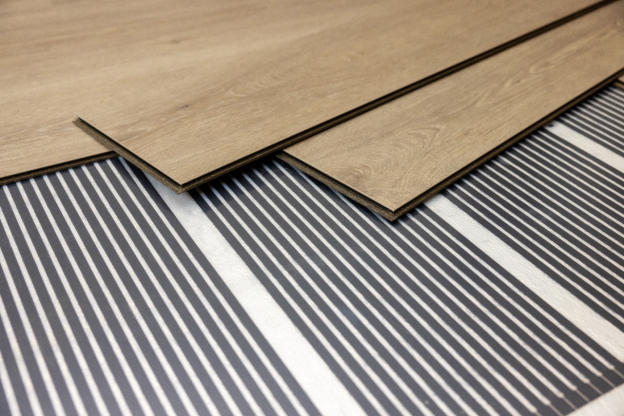
- Even heat:Radiant heating provides even and consistent warmth without the need for ducts or vents.
- Energy efficiency:Radiant heating can be more energy efficient than traditional heating systems.
- Aesthetically pleasing:Radiant systems are hidden from view, allowing for more design flexibility in your home,
The disadvantages of radiant heating include:
- Installation cost:Installing radiant heating can be expensive, especially if it’s not already built into the home.
- Warm-up time:It may take some time for radiant systems to heat the space, which can be less convenient if it’s cold and you want your home warm.
- Limited cooling:Radiant systems are primarily designed for heating. Cooling may require a separate system.
Fireplaces and Wood-Burning Stoves
Fireplaces and wood-burning stoves provide both heat and ambiance to a home. They burn wood or other solid fuels to produce heat.
The advantages of fireplaces and wood-burning stoves:
- Ambiance:They create a cozy and inviting atmosphere, making them a popular choice for many homeowners.
- Backup heating:They can serve as a backup heat source during power outages.
- Independence from utility companies:They do not rely on electricity or gas, providing independence from utility companies.
The disadvantages of fireplaces and wood-burning stoves include:
- Air quality:Burning wood can produce indoor air pollutants and affect air quality if not properly ventilated.
- High maintenance:Regular cleaning and maintenance are required to keep these systems safe and efficient.
- Inefficient:They may not be the most efficient way to heat a home and can result in heat loss through the chimney.
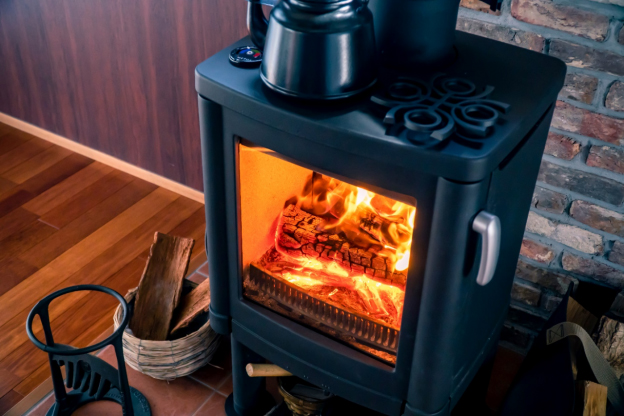
Solar Heating
Solar heating systems use energy from the sun to heat air or water, which is then distributed throughout your home. These systems are eco-friendly and can help reduce energy bills.
The advantages of solar heating include:
- Renewable energy:Solar heating relies on a renewable energy source, reducing reliance on fossil fuels.
- Energy savings:Solar heating can lead to significant energy savings, especially in sunny regions.
- Environmentally friendly:Solar systems have a low environmental impact compared to other heating systems.
The disadvantages of solar heating:
- Initial cost:Solar heating systems can have a high upfront cost, though incentives and rebates may offset this.
- Weather dependence:Solar heating efficiency is dependent on the availability of sunlight, so it may not be as effective in cloudy or rainy regions.
- Storage:Storage systems may be needed to ensure heat is available when the sun is not shining.
Hybrid Systems
Hybrid heating systems combine two or more heating methods to optimize energy efficiency and comfort. One common combination is a heat pump paired with a gas or propane furnace.
The advantages of hybrid systems include:
- Efficiency:Hybrid systems take advantage of the strengths of each component, offering a high-efficiency system.
- Versatility:Hybrid systems can automatically switch between heat sources to maintain optimal comfort and efficiency.
- Cost savings:Hybrid systems can help reduce energy bills over time.
The disadvantages of hybrid systems include:
- Complexity:Hybrid systems can be more complex and require professional installation and maintenance.
- Initial cost:Upfront costs may be higher than single-system installations.
- Maintenance:Regular maintenance is essential to keep both components functioning optimally.
Geothermal Heating
Geothermal heating systems use the constant temperature of the earth below the frost line to exchange heat within the home. This system is highly efficient but requires a significant initial investment.
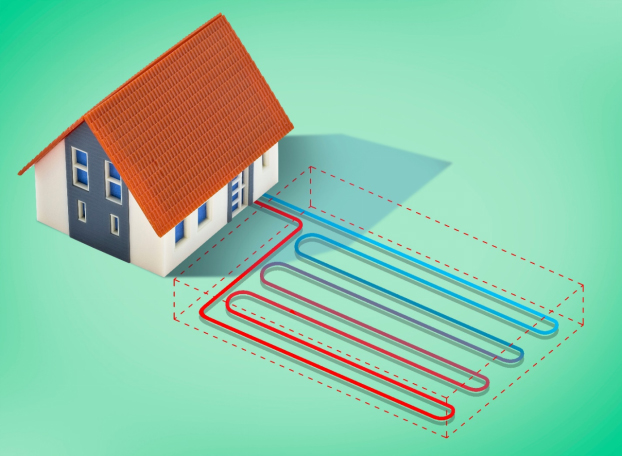
- High efficiency:Geothermal systems are among the most energy-efficient heating and cooling solutions.
- Low operating costs:They have low operating costs and can result in significant energy savings.
- Environmentally friendly:Geothermal systems have a minimal environmental impact.
The disadvantages of geothermal heating include:
- High initial cost:Geothermal systems have a substantial upfront cost for installation and ground loop excavation.
- Space requirements:They require sufficient land or access for ground loop installation.
- Installation complexity:Installation can be complex and may require specialized contractors.
Ductless Mini-Split Systems
Ductless mini-split systems consist of an outdoor unit connected to one or more indoor units. They are highly versatile and provide both heating and cooling.
The advantages of ductless mini-split systems include:
- Zoning:Each indoor unit can be controlled independently, allowing for precise temperature control in different areas.
- Energy efficiency:Ductless systems are energy efficient and can be a cost-effective choice.
- Easy installation:They are easy to install and do not require ductwork.
The disadvantages of ductless mini-split systems include:
- Aesthetics:The indoor units are visible and may not suit all interior designs.
- Initial cost:The initial cost can be higher than traditional central heating systems.
- Maintenance:Regular maintenance is necessary to ensure optimal performance.
How to Choose the Best Heating Option for Your Home
Selecting the best heating option for your home is not a one-size-fits-all decision. Several factors should influence your choice:
- Climate and location:Consider your climate and location. Milder climates may have more flexibility than extreme climates.
- Budget:Determine your budget for both the initial installation and ongoing operating costs. Some heating options have a lower upfront cost but higher operating expenses, while others may require a larger investment but save you money in the long run.
- Energy efficiency and environmental impact:Evaluate the energy efficiency and environmental impact of the heating system. More efficient systems can reduce your energy bills and minimize your carbon footprint.
- Home size and layout:Consider the size and layout of your home. Some heating systems are better suited for larger spaces, while others are ideal for smaller areas or specific rooms.
- Existing infrastructure:Take your existing infrastructure into account. If you already have ductwork, it may be more cost-effective to choose a system that can use it.
- Long-term plans:Think about your long-term plans for your home and your return on investment.
Get Your Home Warm and Cozy This Winter
 /center>
/center>
